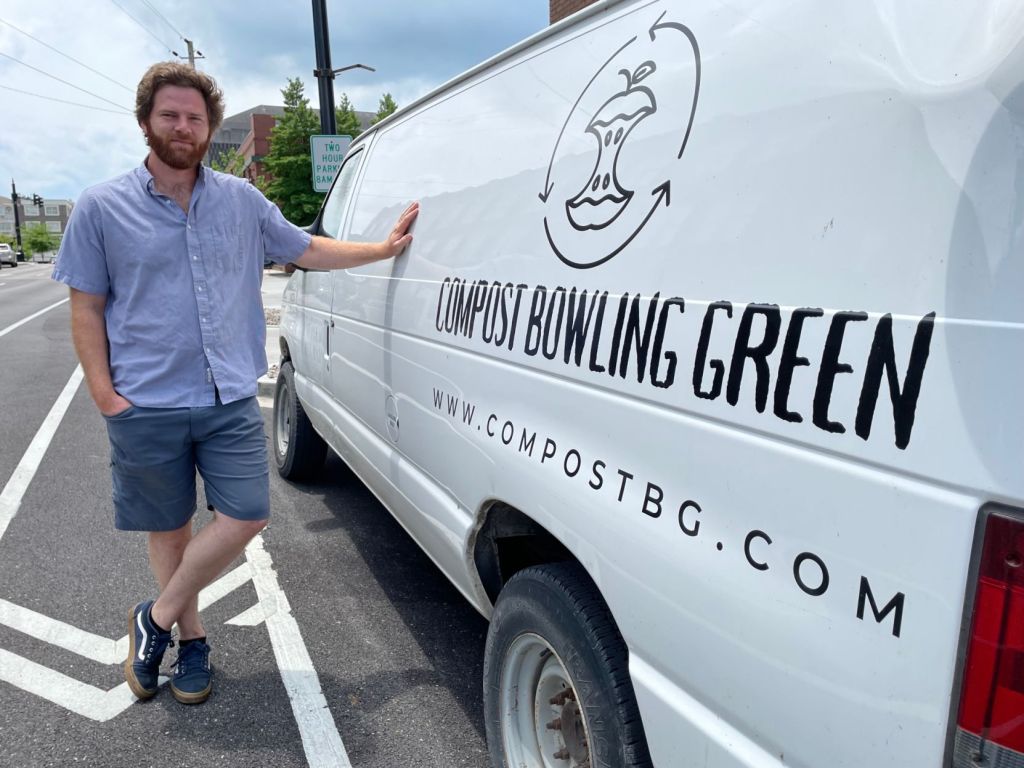Startup Compost BG turning scraps into cash
Published 12:45 am Wednesday, June 22, 2022

- Charlie O’Connell, owner of Bitsy Farm in Rockfield, has started Compost Bowling Green with a goal of making composting of food scraps more prevalent locally.
Charlie O’Connell is definitely getting his hands dirty as he grows his startup small business. In fact, he’s taking that truism to the extreme, with the potential to have an extreme impact on the local environment.
Owner of Bitsy Farm in Rockfield, O’Connell started in March his Compost Bowling Green business that collects food scraps from homes and businesses for composting at the Western Kentucky University Farm.
It may sound like a stinky business model, but the 32-year-old O’Connell believes it can help bring Bowling Green up to speed with a national trend.
Fueled by environmental concerns and the need to extend the life of landfills, composting is growing and food scrap diversion is even being mandated in some parts of the country.
“Most large cities in the U.S. do have composting services,” O’Connell said. “Two companies are doing it in Nashville.
“We decided to start it here when we were looking for ways to make our farm more successful.”
O’Connell considered composting food scraps himself, but the topography of his direct-to-consumer farm wouldn’t allow him to get permitted by the state.
With WKU already composting food scraps from the university’s food vendors, though, O’Connell found an outlet.
“The university allows us to tip there,” O’Connell said. “If it weren’t for them, I don’t know that we could’ve gotten started.”
Compost BG started in March, and O’Connell said he is slowly adding customers who pay a monthly fee of $25 to $30 to have him pick up food scraps for composting.
O’Connell said Compost BG is up to 27 residential customers and three businesses, all of which have their food scraps picked up either weekly or biweekly.
The WKU Farm mixes those food scraps with what it collects on campus and turns it all into compost, a humus-like decayed organic material that is used to fertilize and improve soil.
“We sell it for people to put in their home gardens and to farmers market growers,” said Joey Reynolds, an agriculture technician who manages the WKU composting facility.
Reynolds said that facility processes 2,000 to 3,000 pounds of food scraps per week while the university is in session, with the vast majority of that coming from WKU’s food vendors.
“I’ve had a couple other people talk about bringing food scraps here, but he (O’Connell) is the only one to take the initiative to do it,” Reynolds said.
While motivated to do composting as part of his business strategy, O’Connell is also driven by environmental concerns.
“People are working on ways to increase the lifetime of landfills, and one way to do that is to remove food scraps,” he said. “There’s definitely a need and desire to do food scrap diversion.”
O’Connell explained that food scraps in landfills break down anaerobically and produce methane emissions, adding greenhouse gases to the atmosphere.
Reducing that source of greenhouse gas is beneficial, O’Connell says, and producing compost has further benefits.
“When you add compost to soil, it helps vegetation grow better, so it can help reduce carbon in the atmosphere,” he said.
Helping the public and potential customers understand those benefits is perhaps the biggest hurdle O’Connell faces in growing Compost BG.
“I’m learning that it’s partially about educating people and letting them know you can do it (composting),” said O’Connell, who earned a degree in civil engineering before going into agriculture. “It is an important thing to do.”
For that reason, WKU’s Reynolds believes Compost BG may catch on, particularly among transplants to Bowling Green.
“He (O’Connell) is providing a service that a lot of people want,” Reynolds said. “Some of them have had that kind of service in other places. He’s filling that void.”
O’Connell has been growing Compost BG primarily through word of mouth and social media, and now he would like to boost the business in other ways.
“My long-term goal is to be able to do the composting ourselves at a local farm,” he said. “It would provide an additional revenue stream.”
He would also like to use Compost BG as an avenue for delivering the meat and vegetables grown at Bitsy Farm and, potentially, other farms.
“I see it as a cycle,” O’Connell said. “We pick up compostables and deliver food at the same time. It’s a natural loop of food to waste.”
More information about Compost BG, including what types of food scraps can be composted, is available at the compostbg.com website.



